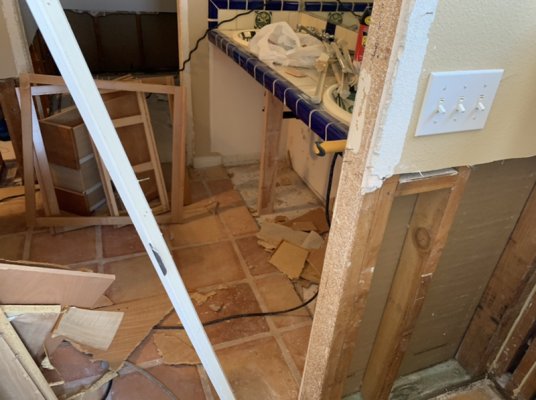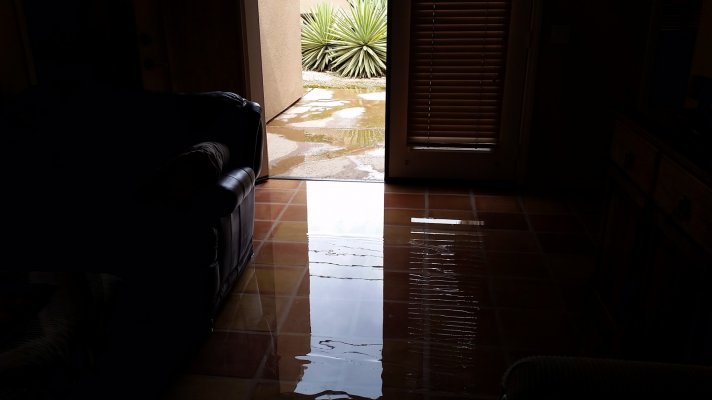calmloki
Give me a museum and I'll fill it. (Picasso) Give me a forum ...
Been feeling pretty mortal lately. Suffice it to say that while mobile slim lucky and lacking in real bad habits the chances are good that I get switched off much earlier rather than later. My gal of 43 years and I, unmarried, have no kids. I'm not filled with philanthropic zeal. Gal and I live a very thrifty life - much of our joy comes from efficient use of time and money and repurposing or restoring to proper function the things others just throw away. We bought sad little rental houses and apartment buildings and put our vision, funds, and physical work into making them places that people liked living in. At 72 I'm pulling back from running the rentals - just don't have the desire or physical ability to do a decent job of it. We've sold some places and are down to a triplex and a 16 unit from our high of 53 units. We have more than enough to sustain one or both of us for a very long time. But efficiency...
Oregon has a 10-11.5% estate tax that kicks in above the $1M mark. California follows the Feds and has an $11.7M estate tax exemption.
Looks like if someone had a $4M estate Oregon would want about $345,000 for an estate tax. Unh Hunh!
Gal and I file separately, I claim our Oregon house and she claims our California house as our primary dwellings. We split our year pretty evenly between the two locations, each with a few extra days in our home states. We own all our real estate as well as most bank accounts, stocks, and loans and property contracts jointly. I'm thinking of declaring California as my primary residence. The annual tax rate is pretty similar to Oregon's. We've no intention to sell our Oregon house - we spent years at our most accomplished level doing a complete redo of the house for us rather than for tenants and Oregon in the summer is Glorious vs sizzling potato chip SoCal desert.
We spoke with a Washington/Oregon lawyer who does estates and she hasn't been real responsive - in the middle of a move. Spoke with our tax person who doesn't seem to be into planning, just preparation. So now I'm trying to figure out who does planning. A CPA seems like (pardon) a bean counter. A CFP seems like a manage our money till it's bled away type. A trust lawyer seems like they would just want to plug us into trusts - which MAYBE we need. I'm looking for someone who can look at our situation and offer thoughtful estate/tax suggestions.
Here's what I've thought:
Oregon's estate tax for residents is based on Oregon real estate, Oregon tangible property, and all intangible property divided by all assets worldwide minus the $1M exemption. Since we own jointly, just divide everything by two for my estate values.
Oregon's estate tax for non-residents is based on Oregon real estate plus Oregon tangible personal property but NOT intangible property divided by all assets worldwide minus the $1M exemption.
Intangible property includes "stocks, bonds, notes, currency, bank deposits, accounts receivable, ... limited liability interests ..." We have about $3.5M in jointly held bank accounts, Cds and stocks. About $1.3M in promissory notes from property sales. About $660K in Oregon land sale contracts - not sure if those qualify as "notes" or not. Our homes in Oregon and California are worth maybe $450K each. and the remaining rentals in Oregon maybe $1.8M and $450K. My numbers are all over the board because of what I don't know, but it seems like as a California resident my Oregon non-resident tax might be more in the $125K range.
Now if we were to form a California LLC and put all the Oregon contracts and property into it as a foreign LLC maybe we could get the Oregon tax WAY down - but levels of complexity and unknown costs...
Things I haven't mentioned yet, if your eyes aren't spinning yet, are that I'm a Kaiser Permanente medical member, which is available in California and Oregon, but not many other states. Don't really want to jump medical ship at this particular point. Wouldn't seem prudent.
Also, maybe in three years or so, as the weather heats up down south we might decide to sell the California house and avail ourselves of the homeowner exemption. Does seem prudent.
Anyway, if you have anything to add - like, "hey dummy, a land sales contract is NOT a note" or California's full, we don't want your kind around here or suggestions for the job title or suggestions for a particular pro who could help us I'd sure appreciate it. I know there are some very savvy California tax people on here and right now I'm just thrashing in the water. - Oh - did I mention our California house flooded about three weeks ago and we don't have a place to live down there at the moment?
Oregon has a 10-11.5% estate tax that kicks in above the $1M mark. California follows the Feds and has an $11.7M estate tax exemption.
Looks like if someone had a $4M estate Oregon would want about $345,000 for an estate tax. Unh Hunh!
Gal and I file separately, I claim our Oregon house and she claims our California house as our primary dwellings. We split our year pretty evenly between the two locations, each with a few extra days in our home states. We own all our real estate as well as most bank accounts, stocks, and loans and property contracts jointly. I'm thinking of declaring California as my primary residence. The annual tax rate is pretty similar to Oregon's. We've no intention to sell our Oregon house - we spent years at our most accomplished level doing a complete redo of the house for us rather than for tenants and Oregon in the summer is Glorious vs sizzling potato chip SoCal desert.
We spoke with a Washington/Oregon lawyer who does estates and she hasn't been real responsive - in the middle of a move. Spoke with our tax person who doesn't seem to be into planning, just preparation. So now I'm trying to figure out who does planning. A CPA seems like (pardon) a bean counter. A CFP seems like a manage our money till it's bled away type. A trust lawyer seems like they would just want to plug us into trusts - which MAYBE we need. I'm looking for someone who can look at our situation and offer thoughtful estate/tax suggestions.
Here's what I've thought:
Oregon's estate tax for residents is based on Oregon real estate, Oregon tangible property, and all intangible property divided by all assets worldwide minus the $1M exemption. Since we own jointly, just divide everything by two for my estate values.
Oregon's estate tax for non-residents is based on Oregon real estate plus Oregon tangible personal property but NOT intangible property divided by all assets worldwide minus the $1M exemption.
Intangible property includes "stocks, bonds, notes, currency, bank deposits, accounts receivable, ... limited liability interests ..." We have about $3.5M in jointly held bank accounts, Cds and stocks. About $1.3M in promissory notes from property sales. About $660K in Oregon land sale contracts - not sure if those qualify as "notes" or not. Our homes in Oregon and California are worth maybe $450K each. and the remaining rentals in Oregon maybe $1.8M and $450K. My numbers are all over the board because of what I don't know, but it seems like as a California resident my Oregon non-resident tax might be more in the $125K range.
Now if we were to form a California LLC and put all the Oregon contracts and property into it as a foreign LLC maybe we could get the Oregon tax WAY down - but levels of complexity and unknown costs...
Things I haven't mentioned yet, if your eyes aren't spinning yet, are that I'm a Kaiser Permanente medical member, which is available in California and Oregon, but not many other states. Don't really want to jump medical ship at this particular point. Wouldn't seem prudent.
Also, maybe in three years or so, as the weather heats up down south we might decide to sell the California house and avail ourselves of the homeowner exemption. Does seem prudent.
Anyway, if you have anything to add - like, "hey dummy, a land sales contract is NOT a note" or California's full, we don't want your kind around here or suggestions for the job title or suggestions for a particular pro who could help us I'd sure appreciate it. I know there are some very savvy California tax people on here and right now I'm just thrashing in the water. - Oh - did I mention our California house flooded about three weeks ago and we don't have a place to live down there at the moment?


